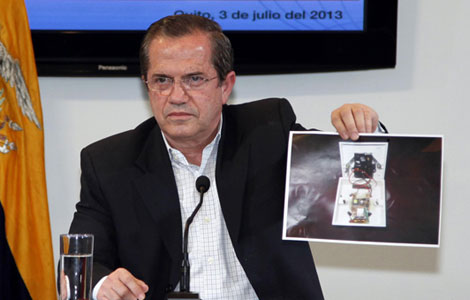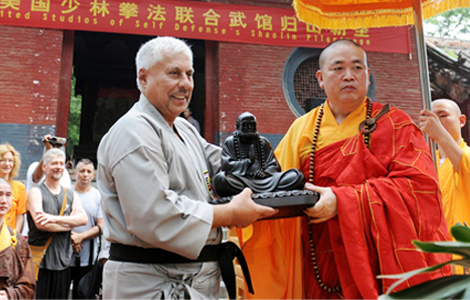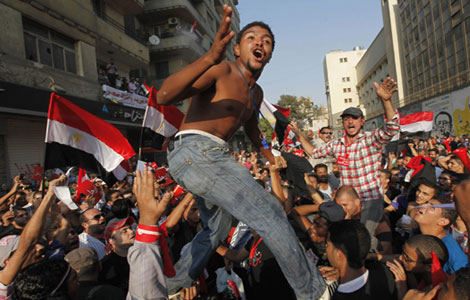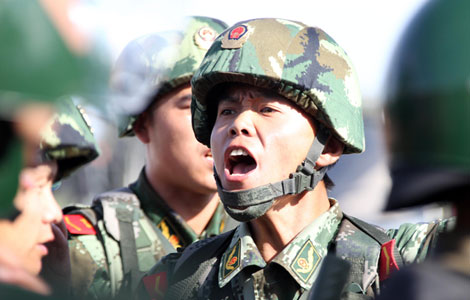Morsi held by Egypt army; West has 'coup' dilemma
Updated: 2013-07-04 14:47
(Agencies)
|
||||||||
Youth
Sisi said: "Those in the meeting have agreed on a road map for the future that includes initial steps to achieve the building of a strong Egyptian society that is cohesive and does not exclude anyone and ends the state of tension and division."
Reflecting the hopes of the "revolutionary youth" who led the charge against Mubarak, only to see the electoral machine of the Brotherhood dominate the new democracy, the young man who proved Morsi's extraordinary nemesis said the new transitional period must not repeat the mistakes of the recent past.
"We want to build Egypt with everyone and for everyone," said Mahmoud Badr, a 28-year-old journalist who first had the idea two months ago for a petition calling on Morsi to resign. By last weekend, the "Tamarud - Rebel!" movement was claiming 22 million backers, many of whom were on the streets on Sunday.
Morsi's overthrow may have repercussions in Tunisia, whose uprising prompted Egyptians to take on Mubarak, the last in a 60-year line of military-backed rulers. Tunisia now has its own "Tamarud" movement, seeking to end Islamist government.
On Tahrir Square, cradle of Egypt's January 25 revolution in 2011, huge crowds in the hundreds of thousands set off fireworks and partied, chanting: "The people and the army are one hand!"
The past four days have seemed to many like a fast-motion rerun of the 18 days that brought down Mubarak, when the army that had long backed him realised his time was up.
In addition to three TV channels that went off air, including one owned by the Brotherhood, the authorities arrested a staffer at Egypt's Al Jazeera Mubasher, owned by the Gulf state of Qatar. The emirate is seen as close to the movement.
Saudi Arabia, in contrast, has long been suspicious of the Brotherhood's international ambitions. King Abdullah sent a message of congratulations to the man replacing Morsi. The United Arab Emirates also welcomed the change in Cairo.
Oil prices initially rose on fears that unrest in Egypt could destabilise the Middle East and lead to supply disruption but prices retreated after the army toppled the president.
With Egypt's economy left ragged by the unrest of the past two and half years, Morsi had been helped by gifts and loans from Qatar. The new authorities may hope for help from other quarters. Notably, an IMF loan has long been stalled.
The official spokesman of the Muslim Brotherhood said supporters were willing to become martyrs to defend Morsi.
But the Brotherhood also has an 85-year history of survival and may take a long view of whether it is better to draw in its horns and watch others try to reform Egypt's sclerotic economy.
A Brotherhood official, Gamal Heshmat, told Reuters: "There is absolutely no direction towards violence. The Brotherhood are not raised on violence. Their cause is a peaceful one, defending their rights, which is stronger than a military coup."

 Ecuador finds spy mic for Assange meeting
Ecuador finds spy mic for Assange meeting
 US martial artists arrive at Shaolin Temple
US martial artists arrive at Shaolin Temple
 July 4 in Prescott: Balance of grief, patriotism
July 4 in Prescott: Balance of grief, patriotism
 Jubilant crowds celebrate after Mursi overthrown
Jubilant crowds celebrate after Mursi overthrown
 Growth slowing for services
Growth slowing for services
 Venezuela eyed as Snowden seeks asylum
Venezuela eyed as Snowden seeks asylum
 Anti-terror drill staged in Xinjiang
Anti-terror drill staged in Xinjiang
 Memorial service held for 19 Arizona firefighters
Memorial service held for 19 Arizona firefighters
Most Viewed
Editor's Picks

|

|

|

|

|

|
Today's Top News
US welcomes China's engagement in Africa
Data show shifts in US, China economies
Obama, Merkel agree talks on surveillance program
Filipino executed for drug trafficking
Obama orders US to review aid to Egypt
Snowden still in Moscow
China urges more efficient uses of fiscal funds
Egypt army topples president Morsi
US Weekly

|

|







